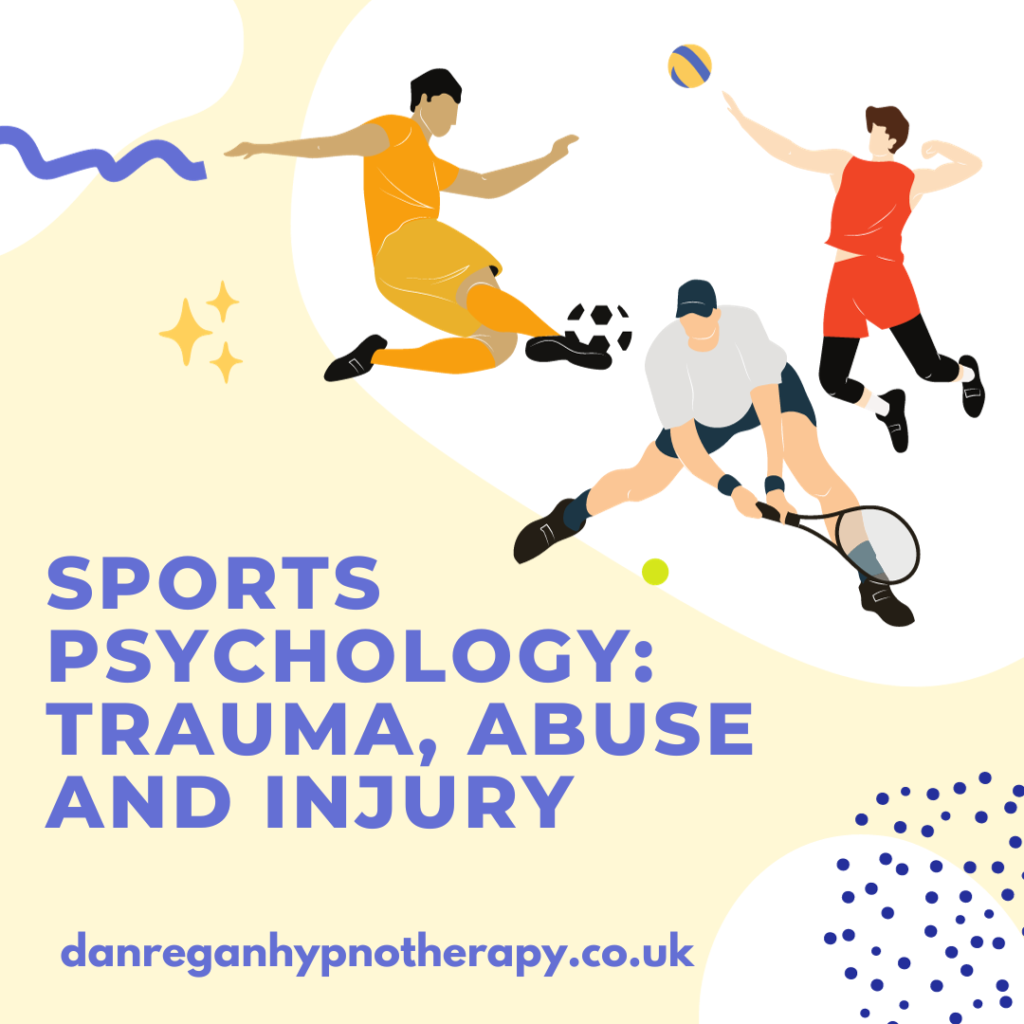Required
Sports Psychology: Trauma, Abuse and Injury
Sports Psychology: Trauma, Abuse and Injury
I work with lots of sports people who are seeking to improve their performance or to bounce back after a setback. At the professional level, the benefits of sports psychology are well understood, and that recognition of the importance of mind-set and mental attitude is something that anyone who wants to improve and perform should be incorporating into their training programme.
Sports psychology can take many forms and will depend on the particular individual. For example, recently I worked with a triathlete who wanted to stop the negative internal dialogue that impacted on his performances. It was those pesky thoughts that can make us hold back and become lost in thoughts of potential injury or things going wrong, rather than focusing on what is actually happening.
I’ve helped footballers who wanted to get their motivation, confidence and self-belief back, horse riders who had become anxious and fearful after a fall, fighters nervous about competing, cyclists too anxious to ride and many others who knew that they would benefit from effective sports psychology help to engage in and enjoy the sport they love. Many of these have kindly gone on to give feedback on how their sessions helped and there are many, many more who preferred to just get on and deliver in their sporting arena.
And recently new research has again highlighted the importance of effective psychological help in sport. This research looked at the impact of lifetime sexual and physical abuse and trauma and its association with sports and non-sports injury.
Sexual and Physical Abuse and Injury in Sport
The study (reference below) set out to examine associations between lifetime sexual and physical abuse, and the likelihood of injury within and outside sport in athletes involved in competitive athletics.
What they found from their research was that lifetime sexual and physical abuse were associated with an increased likelihood of injury among female athletes. In the study, lifetime physical abuse among female athletes was found to be associated with a 12-fold increased likelihood of sports injury and lifetime sexual abuse with an 8-fold likelihood of non-sports injury.
They go on to suggest that emotional factors should be included when looking at and investigating injuries sustained by athletes.
As the study says, “It is increasingly recognised that the emotional backdrop is an important regulator of adaptation to sports load in high level sport, and that the athlete’s emotional state has to be considered in the timing of training and performance.”
How true is that! And whilst the study looked at high level competitive athletes (track and field), such considerations are going to apply to any of us who engage in sport and who seek to improve our training and performance.
There could be many psychological reasons why lifetime sexual and physical abuse lead to such an increased likelihood of injury. There may be elements of self-blame, pushing too hard as a coping strategy, fears and doubts from negative comparisons with others, fears of missing training, low self-worth, fears about criticism and potentially having been habituated to pain meaning improvement. There could also be other issues such as alcohol or drug use involved.
I think one of the key take-aways form this research is that non-sporting emotional and physical abuse can impact on the likelihood of injury. This means that, whatever your sport and current level, seeking effective sports psychology help add therapeutic support can potentially help reduce your risk of injury and help to understand any injury. Taking steps to address past issues with therapy can reap rewards in sports performance.
Emotional issues can also be wider than this as anxiety and stress levels will often have impacts on training and performance. So by taking action to resolve these issues and improve emotional resilience you may very well find many pleasing positive results in your sporting training, improvements and achievements.
To your success
Dan Regan
Sports Psychology Ely & Newmarket
If the issues discussed in this article have resonated with you then you can come for a free confidential chat to talk them through – Appointments with Dan
And if you want to know what others have said after their sports psychology help you can read all of that here: What They Say
And check out these powerful hypnosis downloads that can start helping you right away with anxiety, confidence and more: Hypnosis Downloads
Reference: Timpka T, Janson S, Jacobsson J, et al, Lifetime history of sexual and physical abuse among competitive athletics (track and field) athletes: cross sectional study of associations with sports and non-sports injury. Br J Sports Med Published Online First: 06 September 2018. doi: 10.1136/bjsports-2018-099335
Get Your Copy Right Now…
Subscribe to Dan’s Digest filled with tips, strategies and techniques and get instant access to your free rapid relaxation hypnosis audio track.
Enjoy feeling and being more mentally calm and physically relaxed right now:





0 Comments